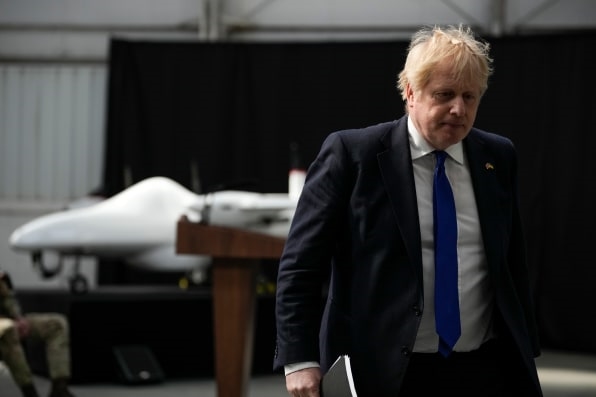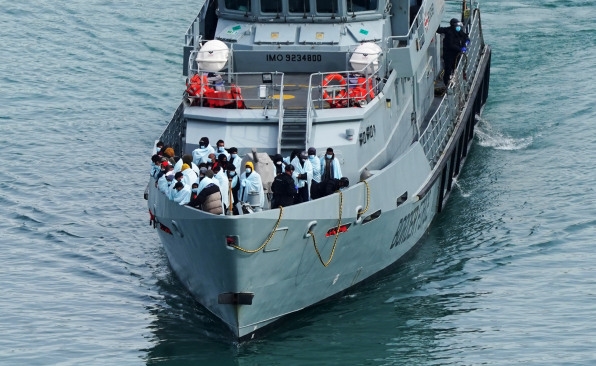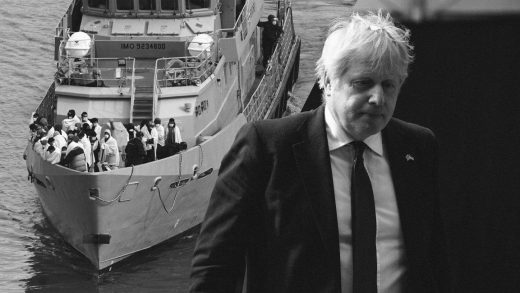Human rights experts condemn U.K. plan to send asylum seekers to Rwanda
Starting in 2001, the Australian government sent thousands of incoming asylum seekers to the remote Pacific nations of Papua New Guinea, Manus Island, and Nauru. There, while waiting in squalid detention centers on resettlement decisions, migrants, including children, endured human rights abuses.
Now, humanitarian groups worry that history will repeat itself as the U.K. begins its own migrant offshoring policy, on the grounds of ending dangerous trafficking routes, including across the English Channel by boat. Explicitly citing the Australian example as “successful,” the U.K. plans to reroute certain asylum seekers 4,000 miles south to Rwanda—a decision, some human rights watchers say, that could also pertain to Ukrainian refugees fleeing war.
On Thursday, Prime Minister Boris Johnson announced the U.K.-Rwanda Migration Partnership, a plan requiring the country to send some incoming migrants to Rwanda, as part of a new package intended to alleviate alleged pressures on the British asylum system while boosting Rwandan economic development. The government justified it as a humane way to curb dangerous and illegal people-smuggling. “Anyone arriving illegally in the U.K. may be eligible,” reads the official Home Office fact sheet, adding that those who can afford to pay for the smuggling routes are by definition not in-need asylum seekers, and are “economic migrants” from safe countries.

[Photo: Matt Dunham/WPA Pool/Getty Images]
But human rights experts immediately decried the plan, arguing that it won’t solve the alleged issue at hand, and degrades the U.K.’s standing on the world stage. “It’s definitely a very cruel, unethical, and inhumane arrangement,” says Emilie McDonnell, a refugee advocate at Human Rights Watch U.K. She says the rhetoric about economic migrants is a myth, citing that two-thirds of people who cross the Channel are granted asylum due to legitimate cases. By the very definition of asylum, there is no such thing as an illegal asylum seeker. As other countries, most notably Denmark, are considering similar “externalization” policies, experts worry that the U.K.’s plan will trigger a “race to the bottom” and encourage similar initiatives in other countries.
This model of “migrant offshoring” is not without precedent. The Australian version drew international outcry, as human rights groups found several cases of abuse, sexual threats and assault, and self-harm and suicides due to ongoing detainment and dire conditions; 51% of the reported abuses in Naura involved children. Before that, the U.S. off-shored Haitian immigrants to Guantanamo Bay, starting in 1991.
Last year, Denmark, which has taken an especially hardline stance against refugees—and tried to send some back to Syria—approved a bill that would allow the relocation of asylum seekers to countries outside of the EU. It also signed a memorandum of understanding with Rwanda to explore a potential agreement. And just this week, there have been echoes of this shifting-responsibility model in the U.S. as Texas governor Greg Abbott started sending undocumented migrants to Washington, D.C., in chartered buses.
While most people seeking asylum in the U.K. come from Iran; Iraq; Eritrea, in northeast Africa; Syria; and Albania, McDonnell believes war-fleeing individuals from Ukraine could also land the same fate. The U.K. did not waive visa requirements for Ukrainians, and there have been major delays in processing them. Steve Valdez-Symonds, refugee and migrant rights director at Amnesty International U.K., agrees that the policy could, in theory, apply to Ukrainian asylum seekers. “Since the Ukrainian visa schemes are not working, that is a real possibility,” he said via email.
Johnson called the £120 million ($157 million) program an “innovative approach driven by our shared humanitarian impulse, and made possible by Brexit freedoms.” He asserted that it has the broader goal of deterring human trafficking, which he said is turning the English Channel into a “watery graveyard.”

[Photo: Gareth Fuller/PA Images/Getty Images]
In touting its own deal, the U.K. applauded Rwanda’s handling of migrants, mentioning 130,000 people it resettled from the Democratic Republic of Congo and Burundi. Human Rights Watch claims otherwise, alleging that under its authoritarian government, “torture in official and unofficial detention facilities is commonplace.” In 2018, Rwandan police killed 11 Congolese refugees for protesting the trimming of food rations. McDonnell points out a key irony: “The U.K. grants asylum to Rwandans fleeing Rwanda” as recently as last year, she says. “How can you be sending people to a country that [has] a human rights record that the U.K. itself has criticized?”
For the Rwandan government, the deal aligns with its Vision 2050 goal, an economic development proposal under which Rwanda intends to become a middle-income country by 2035, and high-income by 2050. According to Rwandan news outlet Kigali Today Press, U.K. investments will contribute to some of the plan’s goals, including vocational training, small business support, and climate-resilient policies, all supposedly for the benefit of both Rwandans and asylum seekers.
But McDonnell says that once they’re in Rwanda, asylum seekers will be left in “a state of limbo.” They’ll be housed in detention centers in Kigali, the first of which Sky News reported has a communal eating area, 12 toilets, and 5 showers for about 100 people, who’ll reside in bedrooms of 12 x 12 feet. They will apparently stay for three months while their cases are processed (though in Australia, some stayed for years). “These people will never have the chance to come to the U.K. and seek protection,” McDonnell says.
The plan will likely be subject to legal challenges, as Australia’s was, due to violations of human rights, including right to life, degrading treatment, and arbitrary detention. “Offshore detention and processing in this form is appalling, regardless of where it is,” McDonnell says. “It goes against the spirit of refugee law, which says that we should all be sharing responsibility for refugees—instead of just pushing them onto other countries.”
Fast Company , Read Full Story
(20)



